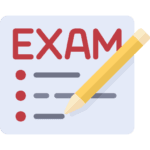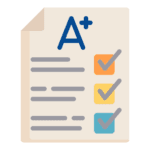The mandatory surgery rotation in medical school is only one of many you’ll have to go through. However, it often is the most taxing and overwhelming one. Moreover, if it’s your first rotation, you’ll need some time to get accustomed to a few things. That includes being out of the classroom, learning how to learn through others, and finding the best resources.
You’ve probably heard multiple tips and advice about which resources to use for your Surgery Shelf Exam. However, that’s often the biggest mistake. Overwhelming yourself with books would put you in an uncertain and confusing phase. Hence, throughout this article, we’ll discuss the numerous ways you can study for the examination. Moreover, you’ll find the best tips and tricks for passing the surgery shelf exam.
How Difficult are Shelf Exams?
Shelf examinations, given by the NBME, includes multiple subject areas. These examinations are also called the clinical clerkship exams and are often present in a student’s third year. However, they’re all notoriously known for being difficult and quite stress-inducing. The Surgery Shelf Exam falls under the Clinical Science subject area.
You might even wonder why medical schools even use these tests. They’re one of the ultimate standardized tests for medical students out there. Moreover, they allow schools to measure their students’ performance compared to many others across states.
So, why are shelf exams difficult? Well, there are multiple aspects. First, since you’re most likely taking them in your third year for the first time, things will be entirely novel for you. The examination content is items you have never stumbled on before. Moreover, you’d be pretty used to sitting in the classroom and taking notes instead of running around the hospital and cramming in study hours.
Moreover, on the Surgery Shelf Exam, a student should be expected to find questions about diagnosing patients and how to treat them post-operation. Hence, most of the items you’ll be questioned on revolving around things you learn through visuals throughout your rotation.
Below is a summarization of the fundamental notes to remember about the Shelf Exams:
- They are subject-based.
- They are standardized examinations that are not mandatory but often used in medical schools.
- Expect to be tested on seven subjects: surgery, pediatrics, obstetrics and gynecology, internal medicine, family medicine, neurology, and psychiatry.
- Traditionally, you’re expected to sit for the examination soon after your rotation ends.
- As for how many questions are on the surgery shelf, expect to find 110 questions. You’ll have to finish them in a time frame between 2-3 hours.
What Should I Study for the Surgical Shelf Exam?
Let’s break it down into three parts to get an idea of what you should study for the surgical shelf exam. That includes the content outline of the Surgery Shelf Exam. Also, it has items to focus on and which resources to use to study.
Surgery Subject Exam Content Outline
The content outline of the exam spans numerous topics. However, it’s often broken down into four subsections to further illustrate what aspects are more intensely focused on. Hence, below are lists of the weighted percentages you should expect according to systems to study, tasks to master, site of care, and patient’s age.
Systems
- Social Sciences (including death-related problems and medical ethics) 1 – 5%)
- Immune System (1 – 5%)
- Skin & Subcutaneous Tissue (1 – 5%)
- Male Reproductive System (1 – 5%)
- Endocrine System (3 – 7%)
- Female Reproductive System (3 – 7%)
- Renal & Urinary System (3 – 7%)
- Musculoskeletal System (3 – 7%)
- Multisystem Processes & Disorders (5 – 10%)
- Nervous System & Special Senses (5 – 10%)
- Blood & Lymphoreticular System (5 – 10 %)
- Respiratory System (8 – 12%)
- Cardiovascular System (10 – 15%)
- Gastrointestinal System (20 – 25%)
Physician Task
- Applying Foundational Concepts (8 – 12%)
- Pharmacotherapy, Management, & Intervention (30 – 35%)
- Diagnosis, including their history, examination, patient outcomes, and care (50 – 60%)
Site of Care
- Emergency (25 – 35%)
- Inpatient (30 – 35%)
- Ambulatory (35 – 40%)
Patient’s Age
- 0 – 17 years (8 – 12%)
- 18 – 65 years (60 – 70%)
- 66 and older (20 – 25%)
What to Focus on For Surgery Shelf Exam?
As for how to do well on your surgery shelf exam, you’ll need to figure out which items to focus on. You cannot divide your attention between all the systems equally. You can notice that not everything will be addressed equally.
For instance, gastrointestinal and cardiovascular systems are the highest weighted percentages found in the examination. Moreover, since you’re sitting for the Surgery Shelf Exam, you’re expected to be able to handle the post-operational care required. Patients require extensive care after their operations, which is the primary concern in this exam.
Moreover, you’ll often be tested on numerous hypothetical situations through the exam. Expect to find some questions requiring you to diagnose an illness and detailed questions that state patients’ conditions pre and post-operation.
Best Resources for Surgery Shelf Exam
There are numerous resources out there. However, while we don’t want to leave any of them out, some of our favorites include the following:
- Dr. Pestana’s Surgery NotesDr. Pestana’s Surgery Notes: it can easily fit into your pockets. Hence, you can use it throughout breaks when you’re on rotations. It provides an overview of tough topics to understand. However, use this as a stepping stone and not your sole resource.
- OnlineMedEd: has both a free and premium version. Even if you don’t want to buy the premium, as it really isn’t required, you can use the videos to further understand the visuals behind the topics you’re studying.
- Virgilio’s Surgery: A Case-Based Clinical Review: this comprehensive book is possibly one of the best resources for the Surgery Shelf Exam. Many medical students recommend this as a primary resource, as it covers all aspects of the exam.
What is a Passing Shelf Score?
There isn’t a specific passing score for the Shelf Exam because it differs according to the school you attend. Hence, the passing criteria can depend on numerous items. Most schools have guidelines that require you to fall into a specific frame. These include a particular percentile, a grade above the national average, or a typical standard deviation above the mean score.
Since Shelf Exams are scored on a national average, things might differ according to the year you take the exam. However, there is a list compiled by Nathan Copeland via OSR list serve in 2009 that states the typical requirements per school. You might find your school requirements on this list. If not, simply reach out to your administration.
However, a more general list to refer to for passing grades is found below:
- Internal Medicine: >11th percentile
- Surgery:>10th percentile
- Family Medicine:>4th percentile
- Neurology:>11th percentile
- Pediatrics:>11th percentile
- OB/GYN:>22nd percentile
- Medicine:>11th percentile
How Do You Study for the Exam: 5 Techniques
We recommend you follow numerous steps to learn how to study for the surgery shelf exam. These are included below.
Organize Your Study Space
While many students neglect to follow this step, we believe it’s one of the most fundamental. You’ll find it quite challenging to study in a cluttered space. Hence, ensure your study desk is always cleared out so your mess won’t jam your headspace.
Study One Book
Avoid studying from multiple resources and instead try to focus on one comprehensive book that covers all the topics you’re looking for. That way, you avoid jumping back and forth between resources and mixing things up. Moreover, keep sticky notes where you find difficult or subjects you haven’t stumbled upon before to easily access them later.
Do Questions
You can find surgery shelf questions from multiple resources, including Board Vitals, AMBOSS, and Brainscape decks. Solving as many questions as possible is absolutely the most vital part of the exam. You should never go to any of the Surgery Shelf Exams without the proper practice.
Make a Schedule
Don’t study smart. Instead, study hard. Hence, create a schedule that’s solid yet flexible. Don’t stress yourself out too much, but allocate two hours out of your day tailored towards your Surgery Shelf Exam preparation.
Make a list of the topics you have to cover. Then, try to divide them into weeks to find out how long it would take you to cover all of them. Moreover, don’t push all your studies to the last minute. Instead, aim to start on the very first day.
Take Notes
Grab yourself a large notebook or a binder to keep your notes and questions inside. For instance, whenever you’re surfing the internet to find the answer to something you don’t know, note it down with its explanation. The same thing applies to the questions you’re solving. If you’re going through exam questions and feel unsure about one of them, note it down with its answer, a flow diagram, and an explanation.
Wrapping Things Up: How to Do Well on Your Surgery Shelf Exam?
Don’t stress yourself out too much. Instead, find small ways in which you enjoy your rotation. That could be that you’re interacting with doctors and patients or the fact that you have a more hands-on experience instead of a classroom-oriented one.
If you start studying on day one and stay on track, you’ll be more than ready to take the exam! Remember, aim to score in a high percentile, but the most critical factor in passing the Surgery Shelf Exam.












